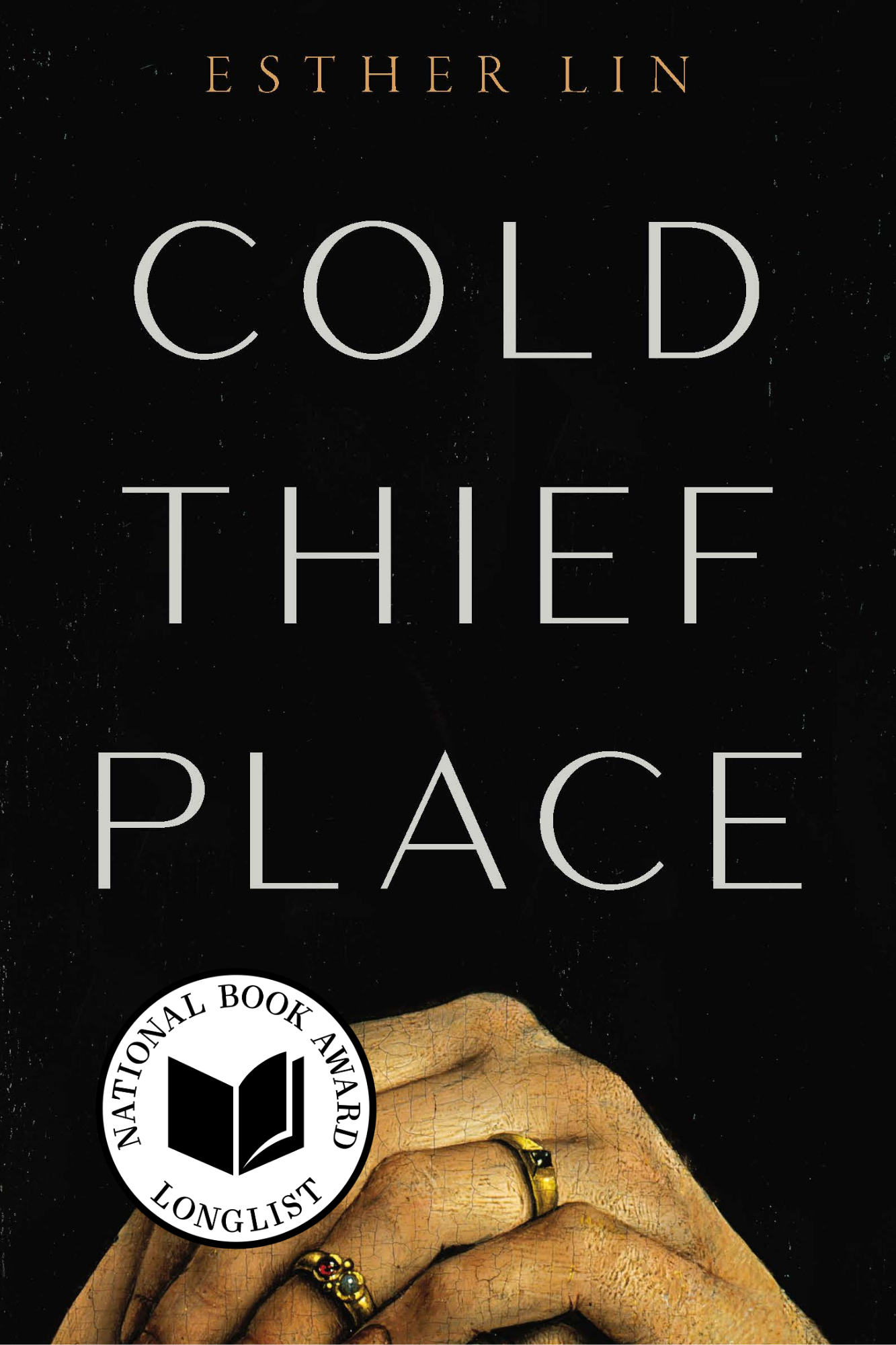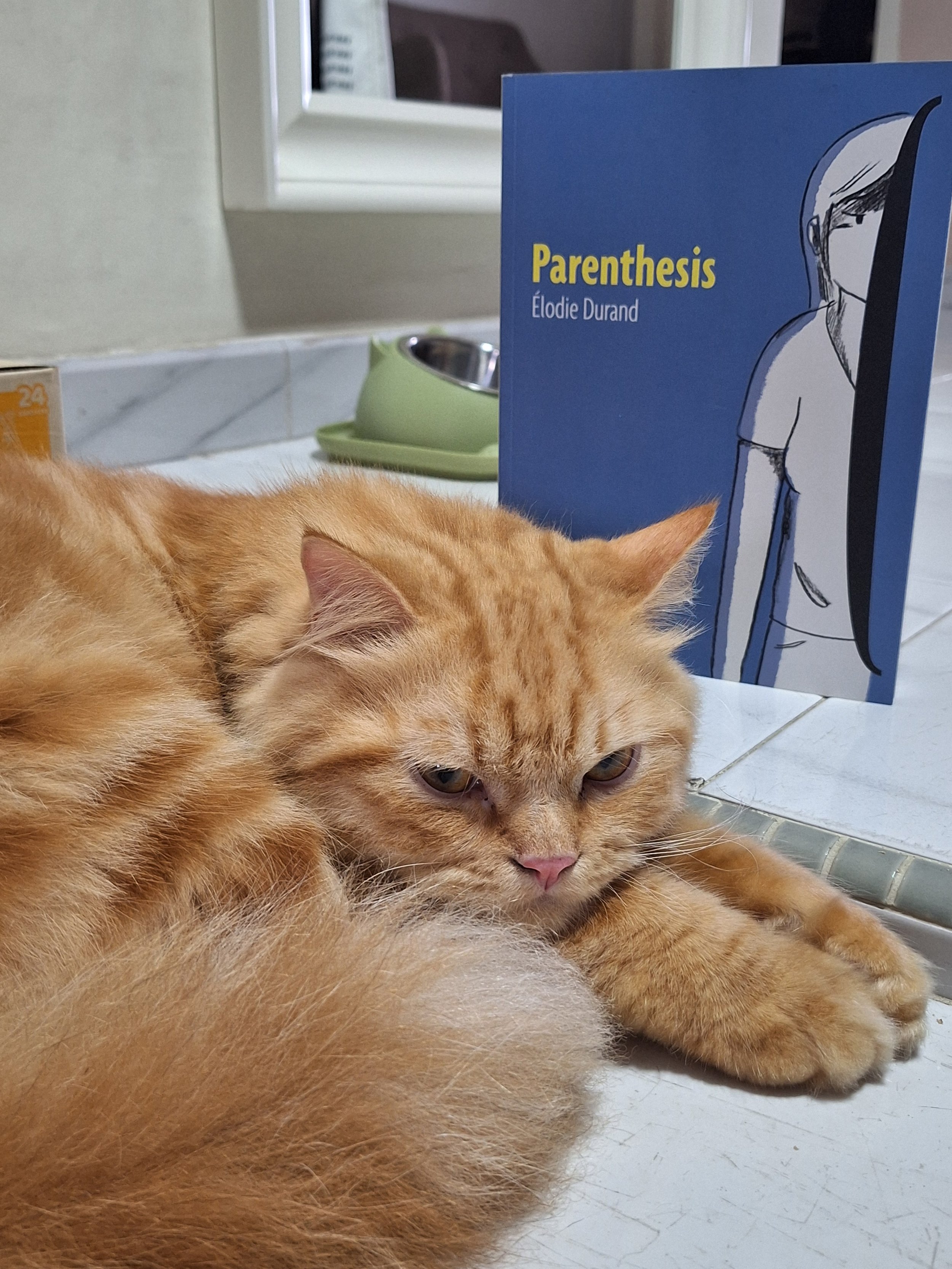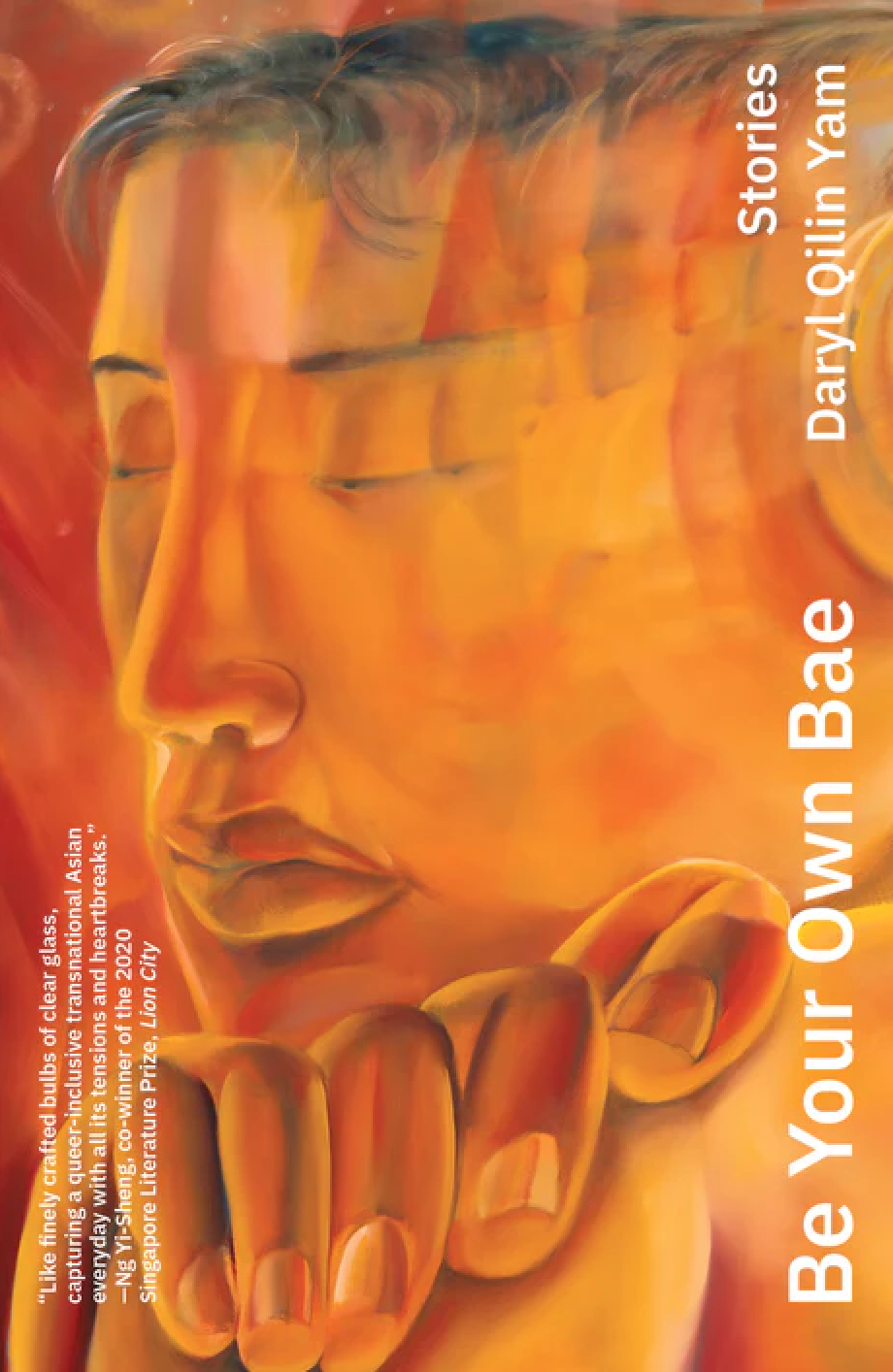In Scatterings, a Cold Beauty
By Hannah Chia
Review of Cold Thief Place by Esther Lin (USA: Alice James Books, 2025)
“A people with lineage can still be scattered.”
Image description: Book cover with the author’s name in amber letters at the top and below it the title, Cold Thief Place, in white lettering against a black background; in the lower quadrant is a Netherlandish renaissance-era painting of folded be-ringed hands and a round seal that reads “National Book Award Longlist.”
In many ways, the metaphor of seeds can be likened to that of diaspora—the ancient Greek root word of diaspeirō, after all, means "I sow, I scatter". Esther Lin’s Cold Thief Place is a powerful meditation on what it means to be sowed and scattered, and a confrontation of what seeds we carry within us. It asks what it means to shoulder the heft of memories, personal or inherited, of a place far away—whether that distance is counted in miles or time.
Born in Rio De Janeiro, Brazil, Lin is the daughter of Chinese parents who left their homeland in search of new beginnings, fleeing the shadows left by the Communist regime. Yet the struggles do not end once they find themselves beyond the country’s borders; instead, their struggle to gain legal citizenship in the United States is fraught with trauma and violence inflicted by state immigration apparatuses, alongside the gendered and emotional pressures shaped by patriarchal norms. Through a series of 30 poems, Lin writes of her family’s journey with all the rawness and grace of a master storyteller, taking readers across three continents—Asia, South America, and North America. Lin herself remained undocumented for 21 years.
The title of the book takes directly from Jean Rhys’ 1966 novel, Wide Sargasso Sea, in which the character Christophine asks the novel’s protagonist, Antoinette, “Why do you want to go to this Cold Thief Place?” in reference to the latter’s desire to go to England. The titular first poem in Lin’s book, ‘Cold Thief Place’, thus echoes the doubts in Christophine’s question in mythic, sparse free verse. Were the harsh realities of living undocumented truly worth it, for the imagined promise of a better life?
What did I fear more?
A fire clawing
its way along my rug.
Offering me what I love best.
Or a man at the door asking
quietly my name, my date of birth.
The intimacy of each poem that follows reads almost like a confession, as Lin recounts with striking emotional detail formative episodes in her and her parents’ lives. The ‘Cold Thief Place’ she refers to here is therefore both imagined and real; a distant utopia made tangible through scars that come with the theft of dignity, cultural identity and belonging. Lin also leaves it unclear if this Place refers specifically to the USA, Brazil or elsewhere. The poems nonetheless do well to reflect the unforgiving nature of immigration systems, and the chill of being far away from any place one can truly call home.
Visceral accounts of Lin’s own experiences as an undocumented immigrant bring into focus the harrowing realities that millions in similar predicaments face each day; stories which render the fear and violence of displacement with brutal clarity. In the sharp half-rhymes of the poem ‘When ICE Came for Me’, one can almost taste the iron of blood in their throat:
[...] This is how I flee.
My legs doubled, then tripled,
in the place where I should not be.
I piss and I bleed here.
All around me, animals leap.
Being undocumented often means dealing with unknowns, in-betweens, and ambiguities, as is the moral chastising in labelling one “illegal”. Lin exposes this grey area here, detailing the lengths many in her position often have to go to, including dealings with the criminal underworld, to obtain legal status.
As Lin explains in a Poetry Society of America feature, 'Despite my best efforts, I am more like my mother than not… we both married for the permission to live in circumstances we found tolerable.” In Lin’s case, this was for a green card in the US, an affair detailed in ‘Disappearing Act’:
[...] He listened,
he listened more, he asked:
To make all that happen
what are you willing to do.
Similarly, Lin’s mother married for the opportunity to flee Communist China, doing so three times as she crossed various borders until she eventually married Lin’s father.
A lone woman released from China
to join her fiancé in Vietnam.
When abandoned, seducing a married man.
When cast out, crossing borders,
a silent river raft in purple twilight.
To meet my father, for the first time.
— ‘I See Her Best’
In ‘The Ghost Wife’, a poem that frames the collection, Lin renders these marital choices as a form of death: a wife, subtextually illegal and “scorched by an eye”, is “hurried indoors” to escape “talk”; made to “lay [...] in a coffin/ upstairs” while others “close the lid”. This condition of sacrificial (un)death, “revered by [Lin’s] grandmother/ and her grandmother” is replicated by Lin after her mother’s death: “I did the unthinkable:/ I married.”
Here then, lies the true triumph of Lin’s work; her ability to weave in the question of what it means to be not just a migrant, but migrant who is a woman, especially when such womanhood is filtered through the lens of Chinese culture.
This is not a new subject to English-language literature; one might recall for instance Amy Tan’s 1989 novel, The Joy Luck Club, and its discussion of similar themes. And yet it remains an exceedingly complicated topic to navigate—whether for those who live it, or those who attempt to write about it. In Chinese families, one’s sense of self is almost always irretrievably bound to the generations that came before them.
Lin’s troubled relationships find form in the later section of the book. Just as the four American-born daughters in Tan’s The Joy Luck Club struggle in their relationships with their Chinese mothers, Lin too navigates the rifts between her and her own mother, driven by personality, generational, and culture clashes.
[…] She
nourished us by nourishing us—
she wrapped dumplings of crystal
shrimp, sliced heavy eggplants,
and fish, always one fish
gleaming among the meats and greens.
I hardly ate. It was too rich, too much
of everything. Which annoyed her.
Why won’t you accept what I offer?
I work so hard. Why? Why?
— ‘Diagnosis’
In Lin’s case however, the weight of her relationship with her mother balances not merely on a swan feather—Tan’s emblematic symbol of the hope the mothers in The Joy Luck Club hold for their new lives and children in America—but is grounded in physical abuse and a near-tyrannical religiosity. Far from being illuminatory, they cast long shadows for Lin and her siblings, even contributing to their prolonged status as undocumented.
Is it better to be
citizens of Heaven
or of the United States?
Ten years old, I knew well
enough what to say.
Then she called the caseworker.
And this is how my siblings and I
remained illegal.
— ‘Out of the Mouths of Babes’
Especially harrowing are Lin’s own accounts of her own relationships with men in her position as undocumented, detailed in ‘Ms. L— Describe Your Petitioner’ and ‘‘Mr. F— Describe Your Beneficiary’. In these twin poems, Lin takes no holds barred in encapsulating the psychological and sexual violence which disproportionately affect women of undocumented status; Mr F. was to be her petitioner not because she wanted to marry him for love, but because her “father saved three thousand dollars, the market rate for men who petition for illegal women.” Similarly, Lin makes explicit the subtextual violence of her relationship to Mr. F:
My beneficiary loves to play.
Her big toe pinning my cock
just so, just as I’ve described, Now make that face,
I say, and she does. On my back,
blood in my mouth, her hands around
my neck, how hard she concentrates!
— ‘Mr. F— Describe Your Beneficiary’
Indeed, as a UN Women report published in 2021 highlights, “being a migrant accentuates the risks of women and girls to various forms of gender-based violence (GBV) in countries of origin, transit, destination, and return.”
Thus contrary to the ideals of the American dream, where migrants might find a clean slate in starting anew in this land, Lin demonstrates clearly the baggage that many are forced to carry—both by intergenerational trauma and the precarity migrants face—as they try to make new lives.
In discussing the imposition of ‘illegal’ status upon migrants, Lin is unafraid to bring to fore how in America today, North and South, the scars of colonialism continue to run deep and wide—in a pivotal moment midway through the book, the poem ‘For my Father, the West Begins in Africa’, draws striking parallels between the oceanic underpinnings of the transatlantic slave trade and her father’s own journey by sea, following the old trade routes which fuelled the colonial economies of the New World.
Far from being a relic of the past, Lin demonstrates how coloniality is alive and well, a reality as tangible now as it was during the years of formal empire. With the poem ‘In Durban, We Encountered a Problem’, she lays bare the familiar structures of dichotomisation; global colonialism is based on the logic of difference. As Frantz Fanon outlines in The Wretched of the Earth, the world is one in which "two zones are opposed, but not in the service of a higher unity... both follow the principle of reciprocal exclusivity". Coloniser/Colonised. European/Black. Legal/Illegal.
So when we went to the post office,
we didn’t know what to do.
European or Black. Which window?
We discussed, we joined
the Black queue. Then a clerk
ran—really ran!—waving us
to the European window. [...]
Thus in Apartheid South Africa, her Chinese father joins the Black queue at a post office, but is later asked to join the line for Europeans instead. Lin exposes the absurdity of these imposed personhoods; just as the laws are for outlining the legality of migrants, these systems are based not on inherent truth, but arbitrary definitions by those in power.
In the final poem, ‘Illegal Immigration’, Lin teases out the irony of how immigration is policed today in the US, a nation built by migrants unhindered by the very legal defenses that have been put up today to prevent others from doing the same.
Illegal immigration began with a law.
It ends with a new law.
At the same time, immigration is a fundamentally generational endeavour, that despite one’s best efforts, for better or for worse, one can never truly be rid of the lineage they come from:
Immigration wants to know the names
of your parents. The names of their parents.
A people with lineage can still be scattered.
[...]
She speaks. She is speaking.
My name is. I am the child of.
See if that works.
— ‘Illegal Immigration’
The poems of Cold Thief Place touch upon many overlapping and intersecting themes, spanning migration, gender, culture identity, interpersonal relationships, and so forth. The complexity of the subject matter is handled with masterful poise by Lin; writers might struggle even to parse one topic, and yet she balances many.
In doing so, Cold Thief Place prevails too as a successful piece of postcolonial writing, like its predecessor in Wide Sargasso Sea. Just as Rhys complicates the seemingly one-dimensional character of Antoinette as the ‘madwoman in the attic’ in the original Jane Eyre by Charlotte Brontë, so too does Lin challenge the often simplified and reductionist idea of what it means to be ‘undocumented’ or ‘migrant’ as perpetuated by colonial echoes of legal systems. These are labels that mean much more than just what they say on the box, and the human endeavours that they speak of are messy, complex, gritty, yet also empowering, inspiring, and beautiful. In contemplating the memory of her father, she writes:
In place of marble
we weighed stone pine and magnolia,
the difference being the stone pine
is native to Italy, Lebanon, and Syria
and the magnolia evolved
before the appearance
of bees and my brother stood between
two planters, speckled
in their shade, saying over and over,
I don’t know.
They both feel like him, to me.
— ‘Winter’
In the end, what prevails in Lin’s work is a brilliance in making sense of what it means to be undocumented, and how these experiences have sharpened anyone who has lived through them. But it is also a bold meditation on what it means to be human and to live with loss amidst these scatterings, even when humanity itself is forcibly denied by the laws of a land.
Hannah Chia is a Singapore-via-London musician and writer. Fascinated by the beauty of things coming together and pulling apart, she writes in both academic and non-academic contexts, exploring topics of cultural identity, the lived experience of space and time, and flux states of being.




In Taiwan Travelogue, ‘twinned souls… are at once lost, but also found, in translation.’ A review by Eunice Lim.